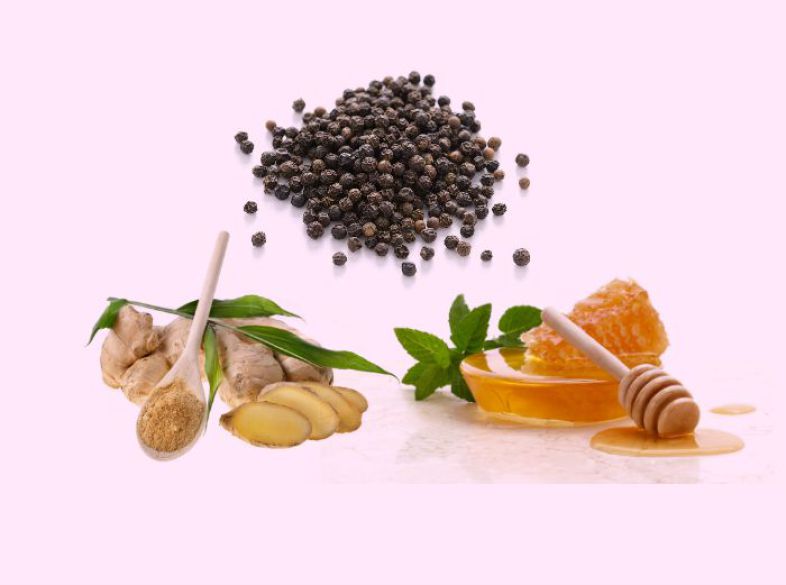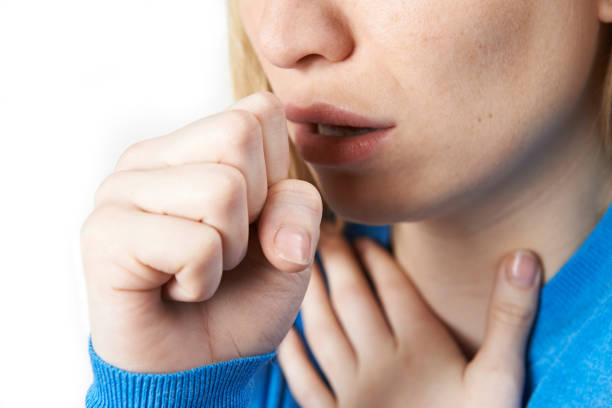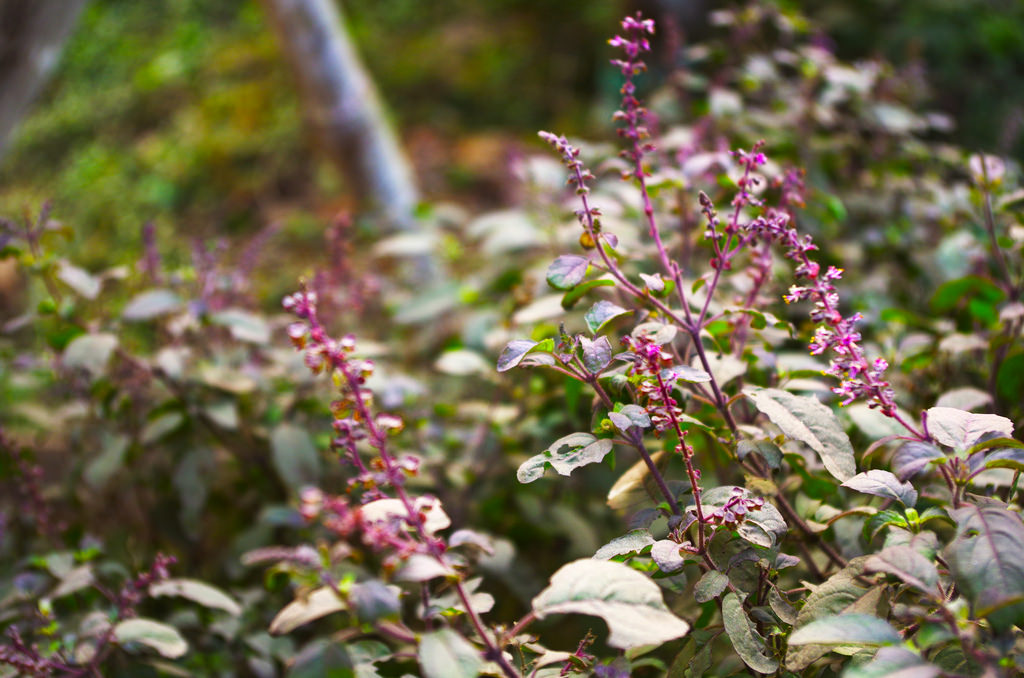Cough is also known as a sudden reflex in which you have to clear your throat and breathing passage from microbes, irritants, fluids and mucus. You can also call coughing as the rapid expulsion of air from your lungs. Coughing can be both deliberate and involuntary. There are two types of cough which can make you suffer dry or wet. Wet cough is caused due to cold, cold extremities or viral attack. Dry cough is caused due to exposure to pollutants, smoke, environment and also if you have allergy from dust. Cough problems have an effect at your lungs, respiratory tract and immunity system. Ayurvedic treatment is oldest holistic medicine treatment and was developed thousands of years ago in India. Ayurveda promotes good health and can be used effectively for both wet and dry cough.
Ayurvedic remedy for wet cough:
Symptoms for wet cough includes pain in your throat and chest, fatigue and irritability.
Using liquorice powder (3 tsp), black peppercorn (1 tsp) and sugary candy (2 tsp) can make an effective natural home remedy. Crush all three ingredients all to form a powder and you should eat half tea spoon of this mixture 4 times a day.
Crush a little ginger to make a paste and paste it on a sieve. Extract the ginger juice and add honey (1 tsp). Mix well and heat it till it becomes lukewarm. You should eat 1 tea spoon thrice a day.
Ayurvedic remedy for dry cough:
The causes for dry cough include pneumonia, sinus infections and viral infections in your respiratory tract. Symptoms are fatigue and weak immune system along with an itchy throat.
Using almonds, butter and sugar makes for an effective natural Ayurvedic home remedy. Make a paste with 7 almonds (soaked overnight) and add 2 tea spoons of butter and sugar each to the paste. You should mix well and eat it twice every day, at morning and evening.
You can also make a paste by mixing small quantity of basil leaves, ginger and honey. Mix well and have 1 tea spoon thrice a day.
Take a glass of warm water and add 1 tea spoon each of turmeric powder and carom powder. Mix it well and drink the mixture about two times a day. This is an effective remedy for dry cough.

Congestion, sore throat or dry cough are just a few complaints amongst the many common throat-related issues these days. But no matter how frequently these illnesses occur, they always make it difficult for you to eat and swallow food, your taste senses go for a toss and you are left with constant discomfort and, in some cases, pain too. Certain ingredients commonly available in Indian kitchens are known to bring long lasting relief. One of these time-tested ingredients is elaichi or cardamom that has been known to help reduce pain and irritability in the throat. Let's look at how cardamom helps in managing these conditions.
Elaichi For Colds & Cough: How Does It Help?
According to Macrobiotic Nutritionist and Health Coach Shilpa Arora, "Oil from elaichi is a useful stimulant; it is an antiseptic that helps calm the digestive system that further heals the throat, colds and cough. Sore throats and cold are also caused due to toxins accumulated in the gut that suppress the immune system. So healing the gut is essential and elaichi counteracts digestive problems." Cardamom or elaichi contains many plant derived alkaloids that known for their potent antioxidants and health promoting properties. Its anti-inflammatory properties limit pain and swelling, especially in the mucus membranes, the mouth and the throat.
Home Remedies For Throat Problems Using Cardamom
Home remedy for cough:
Mix together a pinch of cardamom powder, a pinch of rock salt, a teaspoon of ghee, and half a teaspoon of raw honey. This mixture is known to provide instant relief from cough.
Home remedy for dry throat:
Ayurvedic Expert Ashutosh Gautam suggests making a concoction with green cardamoms and cloves, which helps in combating the irritation caused in throat due to the pollution and dust particles that affect your lungs. Both the ingredients come packed with antioxidants that neutralise the toxic effects of pollutants.
Home remedy for sore throat:
Sore throat can be relieved by infusing cardamom in water and gargling with it in the morning to cure a stubborn sore throat.
Home remedy cough and congestion:
Take cardamom and sugar candy or mishri in 3:1 ratio and powder them well. Take around a teaspoon of this mixture with some water at least two to three times a day to see effective results.
Home remedy for cold:
If you are suffering from cold, it is best to make some warm cup of cardamom tea for yourself. The astringent properties in cardamom tea will help soothe the blocked mucus membranes causing congestion and pain.
Adding cardamom to your food on a daily basis is a good way to avoid throat infections and related conditions and boost your immune system like never before. Do consult a doctor before starting on any regimen if you suffer from chronic throat-related complaints.
A cough is probably one of the most common respiratory diseases that people suffer from. In most cases, it is nothing to worry about and can be cured with cough suppressants and salt water gargles. However, coughing of blood is a serious problem. The coughing up of blood that originates from below the level of the larynx is known as hemoptysis. This can vary in terms of severity depending on the amount of blood being expelled. This disease is a common condition, but on an average, less than 5% of hemoptysis cases are life threatening.
Hemoptysis rarely affects children. The symptoms of this condition include:
Sudden onset of a cough with bloody phlegm
1.Fever
2.Anorexia and weight loss
3.Dyspnoea
4.Paroxysmal nocturnal dyspnoea
5.Fatigue
Chest pain: Medical attention should be sought in cases where this condition recurs often, if it lasts for longer than a fortnight or if the volume of blood expectorated is more than 30ml per day. The various tools that help in the diagnosis of this condition are:
Chest radiography: This imaging modality helps lateralize bleeding and understand the amount of lung involvement. It is quick, inexpensive and can also help detect other underlying abnormalities.
Bronchoscopy: This involves the insertions of a rigid or flexible endoscope into the bronchial passages to check the airways and determine active bleeding sites.
MDCT: A multidetector CT is a non-invasive imaging tool that provides a comprehensive evaluation of airways, lung parenchyma, and thoracic vessels. It can also be used to uncover potential causes of bleeding such as bronchiectasis, pulmonary infections and lung cancer. In some cases, a multidetector CT angiography may also be used.
Oral antibiotics are usually the first stage of treatment for this condition. Smokers will also be urged to quit cigarettes as this can worsen their condition. Treatment for minor hemoptysis may also include:
1.Oral hemostatics
2.Cough suppressants
3.Anticoagulants
4.Radiation of laser treatment
5.Therapeutic bronchoscopy
In its later stages, hemoptysis can be treated with a minimally invasive procedure known as endovascular embolization or with surgery. In some cases, endovascular embolization may also be sued to stabilise the patient before surgery. This procedure reduces the pressure in the hypertrophic arterial blood vessels and decreases the risk of perioperative bleeding.
Hemoptysis is also one of the most common complaints of lung cancer patients. Depending on the stage of cancer and the amount of blood expectorated, treatment in some cases may not be possible. In such cases, a parenteral opioid and fast-acting benzodiazepine may be administered.
Dry cough is one of the most common conditions. It is a reflex action that clears your airway of irritants and mucus. However, dry cough, also known as non-productive cough, doesn't produce phlegm or mucus. An ongoing dry cough can be irritating and may impact your day-to-day life. Most dry coughs are caused by a reaction to an environmental allergen, pollutant or toxin, all of which is expelled by the body from the respiratory system by coughing it out. Some natural home treatments can reduce the frequency of coughing and can soothe throat soreness and irritation. One of the best home remedies is drinking tulsi tea every day. Tulsi has long been known to have innumerable medicinal benefits, also making it an effective and safe natural remedy for cough.
According to Parmeet Kaur, Senior Dietician, Narayana Superspeciality Hospital, "Just add 5-7 tulsi leaves to 300-500 ml of water for few minutes. Keep it to cool and then drink the water infused with tulsi leaves. To make it more effective add few spices such as cardamom, ginger, black pepper and cloves to make a herbal concoction. Drink daily for preventing dark circles, acne, rashes and other skin problems.Moreover, it has been found to protect organs and tissues against chemical and physical stress and is rich in nutrients such as Vitamin K."Common Causes Of Dry Cough
Here are a few causes of dry cough that you should be aware of:
1. Asthma is a condition in which your airways swell and become narrow. Coughing is one of the most prominent symptoms of asthma; therefore, one has to be extremely wary of the effects it can cause.
2.Gastroesophageal reflux disease is a type of chronic acid reflux. It generally happens when stomach acid flows back up into your oesophagus that connects your mouth to your stomach. Excessive stomach acid may irritate your oesophagus and triggers your cough reflex.
3. Viral infection; when you get infected with one of the many viruses that causes common cold, which also includes coughing. However, the post-cold coughs usually linger long after the other symptoms have improved. Dry cough is due to the result of irritation in your airway, which is often sensitive after a viral illness.
4. Environmental irritants; these generally irritate your airways, including smoke, pollution, dust, mold and pollen. Chemical particles also tend to cause a dry cough.
5.Smoking can also be one of the causes of dry cough. The direct inhalation of toxins present in cigarettes can cause such a condition. The toxins settled in lungs cause inflamed reaction and body expels them through coughing.
6. Bronchitis; acute bronchitis often develops three to four days after a cold or flu. It may start with a dry cough and if it prolongs, the coughing spells may bring up mucus.
One Of The Best Solutions: Tulsi Tea
Tulsi is a member of the mint family and its traditional medicinal uses are many, particularly in Ayurvedic tradition. Holy basil, or tulsi, leaves are widely used to prepare desi concoctions to treat microbial infections and boost immunity. It does not only possess antiseptic and analgesic properties that help cure many problems including dry cough, but a tea made using with tulsi leaves relieves allergic bronchitis, asthma and other lung diseases in no time. It also has immunomodulatory (to enhance immunity) and antitussive (relieves cough) properties that provide relief in the respiratory system. In fact, it has certain oils that may clear the congestion.
How To Prepare Tulsi Tea At Home?
Holy basil, or tulsi, is an easy herb to grow at home. So, pick your fresh produce and wash it thoroughly. Follow these steps to prepare tulsi tea at home.
In a pan, add one cup of water and five to seven tulsi leaves.
Allow it to boil for 10 minutes on low flame. Cover the pan and let the leaves infuse in water.
Switch off the gas stove and allow the solution to cool down.
Strain the extract and drink warm to cure dry cough.
In fact, you can add other healing ingredients like cardamom, ginger, black pepper and even honey to this concoction.
Drink it daily to get some relief.
You can also mix honey with fresh tulsi leaves and take it twice daily to reap maximum benefits. No matter what the cause of dry cough may be, tulsi tea may come to your rescue.
Dry cough is one of the most common conditions. It is a reflex action that clears your airway of irritants and mucus. However, dry cough, also known as non-productive cough, doesn't produce phlegm or mucus. An ongoing dry cough can be irritating and may impact your day-to-day life. Most dry coughs are caused by a reaction to an environmental allergen, pollutant or toxin, all of which is expelled by the body from the respiratory system by coughing it out. Some natural home treatments can reduce the frequency of coughing and can soothe throat soreness and irritation. One of the best home remedies is drinking tulsi tea every day. Tulsi has long been known to have innumerable medicinal benefits, also making it an effective and safe natural remedy for cough.Common Causes Of Dry Cough
Here are a few causes of dry cough that you should be aware of:
1. Asthma is a condition in which your airways swell and become narrow. Coughing is one of the most prominent symptoms of asthma; therefore, one has to be extremely wary of the effects it can cause.
2.Gastroesophageal reflux disease is a type of chronic acid reflux. It generally happens when stomach acid flows back up into your oesophagus that connects your mouth to your stomach. Excessive stomach acid may irritate your oesophagus and triggers your cough reflex.
3. Viral infection; when you get infected with one of the many viruses that causes common cold, which also includes coughing. However, the post-cold coughs usually linger long after the other symptoms have improved. Dry cough is due to the result of irritation in your airway, which is often sensitive after a viral illness.
4. Environmental irritants; these generally irritate your airways, including smoke, pollution, dust, mold and pollen. Chemical particles also tend to cause a dry cough.
5.Smoking can also be one of the causes of dry cough. The direct inhalation of toxins present in cigarettes can cause such a condition. The toxins settled in lungs cause inflamed reaction and body expels them through coughing.
6. Bronchitis; acute bronchitis often develops three to four days after a cold or flu. It may start with a dry cough and if it prolongs, the coughing spells may bring up mucus.
One Of The Best Solutions: Tulsi Tea
Tulsi is a member of the mint family and its traditional medicinal uses are many, particularly in Ayurvedic tradition. Holy basil, or tulsi, leaves are widely used to prepare desi concoctions to treat microbial infections and boost immunity. It does not only possess antiseptic and analgesic properties that help cure many problems including dry cough, but a tea made using with tulsi leaves relieves allergic bronchitis, asthma and other lung diseases in no time. It also has immunomodulatory (to enhance immunity) and antitussive (relieves cough) properties that provide relief in the respiratory system. In fact, it has certain oils that may clear the congestion.










